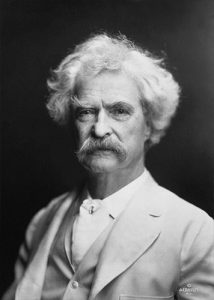
Mark Twain
Mark Twain (real name Samuel Langhorne Clemens, 1835–1910) is considered one of the greatest classics of American literature. Born in Missouri on the banks of the Mississippi River, he worked in his youth as a printer’s apprentice, a journalist, and later as a steamboat pilot. His pen name, “Mark Twain,” was a riverboat term meaning two fathoms of water, a safe depth for navigation.
Twain gained worldwide fame with The Adventures of Tom Sawyer and The Adventures of Huckleberry Finn, works that became not only masterpieces of children’s literature but also profound explorations of American society and human nature. His writing is marked by sharp humor, vivid language, and a keen sense of justice.
In his later years, Twain turned increasingly toward philosophical reflection. The Mysterious Stranger is a product of that period, exploring themes of humanity’s future, morality, religion, and free will. The novella reveals a darker, more contemplative Twain—less familiar to the general public, but equally compelling.
Twain’s literary legacy is immeasurable, influencing not only American but also world literature.

